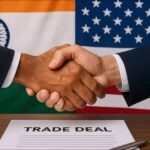India-UK Free Trade Agreement – A Mutually Beneficial Pact

The India-UK trade deal, a highly balanced and comprehensive trade agreement, is likely to create millions of jobs and enormous opportunities for bilateral trade and investment. Therefore, it would be a win-win situation for both countries, writes Prof. Rakesh Mohan Joshi
India’s historic relationship with the UK since colonial times, long-standing cultural and social exchanges, backed by shared democratic system based on the Westminster model make the two nations natural allies with multiple mutual complementarities. The UK is India’s important trade partner and is among the few counties with whom India enjoys a trade surplus since 2004, which means India exports more to the UK than it imports from that country. Even during April-Jan. 2022-23, India had a trade surplus of $ 1.5 billion with the UK. However, general economic slowdown and financial woes in the UK during the recent years led to demand slowdown, which also impacted Indian exports. India’s exports to the UK grew at 9.27% during April-Jan, 2022-23, whereas imports increased at over three times its exports at 33.14% during the same period, which is a matter of concern for India.
UK’s exit from the European Union, an event popularly known as Brexit, in January 2020, resulted from a referendum which was won with a very thin margin of 51.9% of the voters supporting exit from the EU. Brexit even today remains a matter of fierce political debate in the UK. As feared by a number of economists, Brexit adversely impacted British trade and investment. Even by the UK government’s own assessment, British trade and investment is expected to get stunted by 2-8% during the next fifteen years. To cope with growing economic woes, British government is actively exploring alternatives not only to boost its trade and economy, but also as a face-saving exercise.
In post-Brexit UK, FTA with India is being largely perceived as a major achievement that will not only benefit its trade and commerce, but it is also considered to be strategically significant to counterweigh China and strengthening its relation with world’s largest functional democracy.
Contentious Issues
India’s trade deal with Britain missed the deadline of Diwali 2022 set by the British Prime Minister Boris Johnson primarily because of political turmoil in the UK and difficulty in hammering out consensus on contentious issues involving conflicting interests. Some of contentious issues included movement of people and visa regulations, services trade, patent laws, climate change, data localisation and non-tariff trade barriers.
To break the impasse and take forward the negotiations, British Secretary of State for International Trade, Kemi Badenoch, visited India in early December 22. Out of 26 chapters in the proposed India-UK FTA, discussions are closed on 13 chapters by the seventh round of negotiations, which were completed between Feb. 6-10, 2023, in London.
Indian professionals, especially professionals with high level of skillsets, contribute significantly to development of Britain. Yet, Indian negotiators found it difficult to agree with Britain’s increasingly restrictive policies on free movement of Indian personnel under mode IV of GATS agreement, which also seems to be stumbling block even for professionals and genuine businessmen. Indian and foreign students are allowed to stay in Britain for a period of two years to find a job and gain work experience under the present visa rule. However, British Home Secretary Suella Braverman is keen on curtailing the period of stay for overseas students under the post-study visa route to six months. Also, Braverman’s remark in Oct., 2022, that ‘the trade agreement could lead to increased immigration from India’ further complicated the negotiations.
A Win-Win Deal with Enormous Potential for Bilateral Trade and Investments:
Both India and UK are looking forward to benefitting each other by striking a mutually beneficial trade deal as both sides seem keen to take forward trade negotiations despite several diplomatic and trade roadblocks.
Textile is India’s most important export product to the UK wherein India has a whopping trade surplus of $ 1.6 billion. Interestingly, Ready-Made Garments (RMGs) are the largest export product to the UK. RMGs made from cotton only accounted for $ 707 million, whereas RMGs from man-made fibre (MMF) accounted for $ 276 million during April-Jan, 2022-23. India-UK FTA holds enormous potential for facilitating Indian textile industry to increase its competitiveness in the UK market as the competing countries such as Pakistan, Bangladesh and Sri Lanka enjoy free access to the British market under UK’s Generalised Scheme of Preference (GSP). Such tariff concessions are not available to India. The trade deal is expected to benefit the UK industry by providing better access to its products. India is world’s fastest growing major economy and one of the largest markets with 1.4 billion people. The trade deal is expected to lower or remove the current import tariff of upto 150% on whiskey and upto 125% on cars and other British products. For instance, the British whisky industry is likely to be a major gainer of India-UK trade agreement as it is estimated that Brexit has cost dearly the British whisky industry estimated at $6.3 every week due to loss of EU market as it has to negotiate separately with each country about shipping norms, customs and packaging requirements, quality standards etc. India is world’s largest consumer of whisky, accounting for half of world’s whisky consumption. Whisky accounts for over 60% of total sales of IMFL (Indian Made Foreign Liquor). Presently, the share of imported scotch whisky is around 2% of IMFL sold in India. It is estimated that the removal of import tariffs on scotch would make it more affordable and increase its share to 6% of IMFL sold in India.
India-UK trade deal seems to be a highly balanced and comprehensive trade agreement and would be a clear win-win situation for both the countries. It is likely to create millions of jobs and enormous opportunities for bilateral trade and investment. However, to strike the deal early, sensitive issues impacting both sides need to be resolved or may be set aside so as to move ahead with speedy negotiations.
Prof. Rakesh Mohan Joshi is Director, Indian Institute of Plantation Management, Bengaluru, and Professor, Indian Institute of Foreign Trade, New Delhi (rakeshmohanjoshi@gmail.com)














